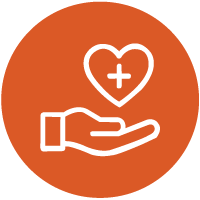
Aim and objectives:
The objective of the joint Türkiye, EU and WHO initiative is to familiarise Syrian refugees with the Turkish health care system so that they may practice medicine in Türkiye and provide health services directly to Syrian refugees. In doing so, the initiative fosters the integration of Syrian refugees in Turkish society and empowers them to serve the community. The initiative also helps to alleviate the burden on the Turkish health system.
Target group:
The initiative targets Syrian health care workers who form part of the 3.7 million Syrian migrants displaced in Türkiye. In particular, the initiative is designed for doctors, nurses, midwives and other medical specialists.
Method:
Syrian health care workers are identified and undergo theoretical and practical training in one of the seven training centres established across the country (Ankara, Gazantiep, Sanliurfa, Izmir and Mersin), under the supervision of Turkish medical professionals. There, they undertake an adaptation course designed by the WHO country office in Türkiye. During the Covid-19 pandemic, training was dispensed digitally through a specifically developed distance learning platform. The course contents include modules on mental health, non-communicable diseases, early childhood development, psychosocial support training in disasters, medical record systems, and occupational health and safety. The centres also train translators to serve as cultural mediators in medical facilities. Eventually, Syrian health professionals receive authorisation to work in the Turkish health system.
Outcomes:
Thousands of health professionals have undergone the program since it began. Teaching materials have been developed as part of the program that have also been used to train Turkish professionals on mental health.
Added value:
The employment of Syrian health professionals in Türkiye is instrumental in suppressing language and cultural barriers in access to health care. Their empowerment and integration in Türkiye provide an occupational opportunity for refugees and a chance to gain additional knowledge. This improved the cultural sensitivity of the health system and has helped to build resilience at the local level. More generally, it has improved the health literacy of Syrian refugees.



